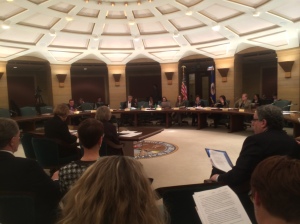Monthly Archives: March 2014
Ask a Travel Nurse: How should I handle getting state licenses as a new Traveler?
Ask a Travel Nurse Question:
I am preparing to find my first travel job and have found that many of the jobs in the states we want to go request that you have your license in hand before applying. My recruiters have even suggested getting these state licenses (before I even know if I will get the job) so that I meet the qualifications for applying.
Some states have walk-thru options, and I’ve resorted to looking for openings in those states first. I unfortunately do not live in a compact state. I guess this roadblock is surprising to me and I am not sure if I should just get licenses in states I know I will eventually want to go or just keep looking? Any advice regarding licenses?
Ask a Travel Nurse Answer:
I would personally not go to the expense of obtaining multiple licenses ahead of time — although some agencies will reimburse you these costs, so if you can afford them upfront that’s one possibility.
Otherwise, try to maybe narrow your choice to two states (one with a walk-thru option and one where you know you will eventually land). Then you could primarily focus your efforts on the state in which you already paid for the license, but keep the “walk-thru state” as a backup option.
Since I’m a “location” traveler, I simply know where I want to go next and am willing to wait for an assignment in that location. But after you have been doing this awhile, you will also accumulate many different state licenses that are pretty easy to renew even if you let them lapse.
Some companies will reimburse for licenses and offer other benefits that will help you get licensed. This is often based on experience, specialty, and likelihood of taking an assignment with the company. You should ask your recruiter if the agency offers any help in this regard.
David
36 reasons why you should thank a union
Did you know that labor unions made the following 36 things possible?
Virtually ALL the benefits you have at work, whether you work in the public or private sector, all of the benefits and rights you enjoy everyday are there because unions fought hard and long for them against big business who did everything they could to prevent giving you your rights. Many union leaders and members even lost their lives for things we take for granted today.
And the nurses are adding an important one:
Safe RN-to-Patient Staffing Ratios

TEXT VERSION:
- Weekends (without work)
- All breaks at work, including your lunch breaks
- Paid vacation
- Family & Medical Leave Act (FMLA)
- Sick leave
- Social Security
- Minimum wage
- Civil Rights Act/Title VII
prohibits employer discrimination - 8-hour work day
- Overtime pay
- Child labor laws
- Occupational Safety & Health Act (OSHA)
- 40-hour work week
- Workers’ compensation (workers’ comp)
- Unemployment insurance
- Pensions
- Workplace safety standards and regulations
- Employer health care insurance
- Collective bargaining rights for employees
- Wrongful termination laws
- Age Discrimination in Employment Act of 1967 (ADEA)
- Whistleblower protection laws
- Employee Polygraph Protection Act (EPPA)
prohibits employers from using a lie detector test on an employee - Veteran’s Employment and Training Services (VETS)
- Compensation increases and evaluations (i.e. raises)
- Sexual harassment laws
- Americans With Disabilities Act (ADA)
- Holiday pay
- Employer dental, life, and vision insurance
- Privacy rights
- Pregnancy and parental leave
- Military leave
- The right to strike
- Public education for children
- Equal Pay Acts of 1963 & 2011
requires employers pay men and women equally for the same amount of work - Laws ending sweatshops in the United States
PLEASE SHARE USING THE BUTTONS BELOW
Senate HHS Committee Considers Board of Nursing/HPSP legislation
The Senate Committee on Health and Human Services passed SF 1890 Wednesday afternoon, which would give the Board of Nursing (BoN) more information about health care professionals who are eligible for the Health Professionals Service Program (HPSP) for treatment.
MNA testified and sent a letter to committee members about the bill and concerns with three elements of the bill. Specifically, the bill still contains measures that could result in a chilling effect on those who self-report to HPSP.
Senators Tony Lourey, John Marty, and Chris Eaton agreed that addiction is a disease, and nurses shouldn’t be disciplined for voluntarily seeking treatment. Currently, the bill from Senator Kathy Sheran requires HPSP to report any instances of drug diversion or other violations related to a person’s impairment to the BoN. Lourey said that gives a “chilling effect” to the program and to those professionals who want to get help before they endanger patient safety. If nurses personal data is released to their Board, it’s logical to predict that they won’t want to get help. Nurses who self-report are far more likely to keep their conditions away from patients and get help, which will foster an environment where people can be honest about their disease and move forward in the recovery process.
As the American Society of Addiction Medicine has found, “fear of disciplinary action and stigma are powerful disincentives to healthcare and other licensed professionals referring their colleagues or themselves to medically necessary addiction treatment. Link to report here.
In addition, discharge from the HPSP program would require a licensee to be automatically suspended for a period of not more than 60 days, regardless of why they were discharged. That’s too long said some lawmakers. Other boards of licensed professionals agree. The executive directors of the Board of Dentistry and the Board of Pharmacy testified that such a long suspension could effectively end a medical professional’s career. They also argued that discharge shouldn’t automatically qualify a licensee for disciplinary action, such as license suspension. Monica Feider, program manager with HPSP, reported to the committee that about 1 in 5 discharges from the program are not due to reasons such as failure to comply. Some leave voluntarily. Some are the result of paperwork that’s incomplete or incorrect.
MNA also testified to concerns with an exemption to what’s called “Chapter 364″ of Minnesota Law, which requires that licensing boards consider rehabilitation of criminal activity.
The committee did modify SF 1890 by adding a clause (in bold) to subdivision 6, “Upon receiving a report from the program manager, based on allegations that the regulated person has engaged in conduct that might cause risk to the public, the participating board shall temporarily suspend the regulated person’s license, “ which allows the determination to come from HPSP.
While SF 1890 passed the Senate HHS Committee, legislators and other experts around the table agreed the issues remain and will have to be settled in the Senate Judiciary Committee or somewhere before a final bill goes to the Senate floor. Even bill sponsors agreed more conversation of refining the HPSP program and the BoN are needed.
Navigate Nursing Staffing Webinar Series
ANA Nominations and Elections Committee Announces Initial Slate for ANA Elective Offices
World Premiere Screening of the New Documentary “The American Nurse”
Who is your “ Gypsy Florence Nightingale ”
FLORENCE NIGHTINGALE: (12 MAY 1820 – 13 AUGUST 1910) WAS A CELEBRATED ENGLISH SOCIAL REFORMER AND STATISTICIAN, AND THE FOUNDER OF MODERN NURSING. SHE IS A ‘MINISTERING ANGEL’ WITHOUT ANY EXAGGERATION IN THESE HOSPITALS, AND AS HER SLENDER FORM GLIDES QUIETLY ALONG EACH CORRIDOR, EVERY POOR FELLOW’S FACE SOFTENS WITH GRATITUDE AT THE SIGHT OF HER. WHEN ALL THE […]
The post Who is your “ Gypsy Florence Nightingale ” appeared first on The Gypsy Nurse.
Tell Our Policy Makers: Keystone XL is Bad for Our Health and Our Planet
Tell Our Policy Makers: Keystone XL is Bad for Our Health and Our Planet
|
Federal policy makers will soon make a final decision on whether to approve the controversial Keystone XL Pipeline project.
The KXL pipeline would carry 830,000 barrels of dirty tar sands oil from Canada across six U.S. states to Gulf Coast refineries in Texas.
To date, policy makers have paid little attention to the health risks associated with the extraction, transport, and refining of tar sands oil and they have refused to learn the lessons from massive tar sands pipeline spills in Michigan and Arkansas. NNU is also concerned about the health impacts of the climate crisis which scientists say would be accelerated by Keystone XL.
The good news is, YOU can still make a difference. BEFORE the policymakers decide, they are asking the public to weigh in with comments on the proposed pipeline.
The deadline for public comment is Friday, March 7.
As an RN you see first-hand how a sick environment harms our patients and our communities. Your opinion and experience matter! Let our policy makers hear your voice.
~~~~~~~~~~~~~~~~~~~~
TAKE ACTION FOR OUR HEALTH
SUBMIT Your Official Comments by March 7, 2014 here!
Suggested talking points below:
1. As a Registered Nurse, I am concerned about the serious effects of tar sands oil spills and other toxic pollution that would be worsened by the Keystone XL pipeline.
2. Tar sands pollution has already been linked to respiratory ailments, cancer, and other adverse health effects.
3. I see the impact of environmental toxins on people’s health every day and want an energy policy that supports a clean environment.
Also see 10 Reasons to Oppose the Keystone XL Pipeline
~~~~~~~~~~~~~~~~~~~~
Additional Actions:
1. Watch and share the video on why RNs say #NoKXL here!
2. Do you have a personal experience seeing the adverse health effects of tar sands, particularly tar sands spills? If so, please SHARE YOUR STORY here!
3. Join the conversation on Facebook here!
4. Join us on twitter @NationalNursesUnited using the sample tweet below with the hashtag #NoKXL
#Nurses treat patients & want to prevent illnesses. That’s why RNs say #NoKXL. See video: http://youtu.be/QcXalhiP3j0 Plz Retweet
5. Listen to RN Katy Roemer on Nurse Talk Radio
~~~~~~~~~~~~~~~~~~
Thank you,
Jean Ross, RN, Co-president
CoreMedical Group
Our team takes the time to get to know you and learn what’s most important to you. Find out why we’re the best in travel nurse staffing!
The post CoreMedical Group appeared first on The Gypsy Nurse.


